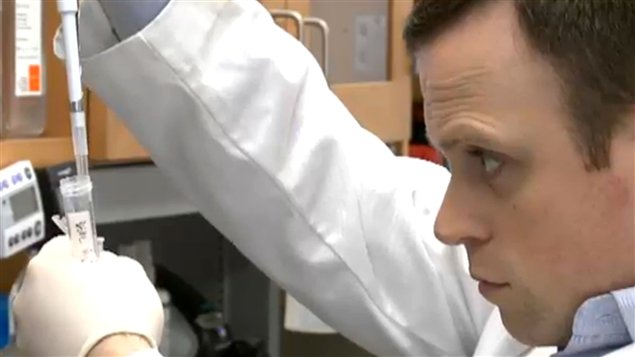Lawyers and researchers around the world are eagerly watching and awaiting a ruling by the US Supreme court on the concept of patents and ownership of DNA.
The nine US justices will begin hearing arguments today on the issue of whether something taken from DNA, can be owned and controlled as a commercial commodity. It should be noted that the U.S. Patent and Trademark Office has been awarding patents on human genes for almost 30 years.

Myriad Genetics is the firm at the heart of the issue, has $500-million invested in the two patents being argued in this case. It involves patents on two genes linked to increased risk of breast and ovarian cancer. Their test looks for mutations on the breast cancer predisposition gene (BRCA) which are associated with much greater risks of breast and ovarian cancer. Although rarer in men, the BRCA mutation increases the risk of prostate, pancreatic, and other types of cancer. Myriad has the only BRCA gene test.
Peter D. Meldrum, the president and CEO of Myriad Genetics, said in a statement that, “Countless companies and investors have risked billions of dollars to research and develop scientific advances under the promise of strong patent protection”.
The intellectual framework that comes out of the decision could have a significant affect on other patents — for antibiotics, vaccines, hormones, stem cells and diagnostics on infectious microbes that are found in nature,” Robert Cook-Deegan, director for genome ethics, law & policy at Duke University, said in a statement. “This could affect agricultural biotechnology, environmental biotechnology, green-tech, the use of organisms to produce alternative fuels and other applications,” he said.
The suit was brought by the American Civil Liberties Union, which challenged Myriad’s patents arguing that gene’s couldn’t be patented. In 2010, a New York court agreed with the ACLU, but two separate federal Court of Appeal rulings agreed that genes could be patented because in this case Myriad’s isolated DNA “has a markedly different chemical structure” from DNA in the body.

After the first Court of Appeals ruling, the case went to the Supreme Court which sent it back following their unanimous ruling against patents on a Prometheus Laboratories, Inc., test that could help doctors set drug doses for autoimmune diseases like Crohn’s disease, saying the laws of nature cannot be patented.
However, the Court of Appeals in a separate hearing upheld their earlier decision which brings the case, 12-398, Association for Molecular Pathology v. Myriad Genetics, Inc., back before the US high court.
It is now up to the Supreme Court to decide whether a scientist working in the lab to isolate a particular gene innovated such that it allows the gene to be patentable.
Richard Gold is a professor in the Faculty of Law McGill University in Montreal and founder of the Centre for Intellectual Property Policy. He says that while all countries are watching the US Supreme Court discussions, Canadian research and biotech companies could be particularly affected, as unlike most other countries, there are really no laws or regulations to govern this area.
RCI’s Marc Montgomery contacted Professor Richard Gold in Montreal
Listen







For reasons beyond our control, and for an undetermined period of time, our comment section is now closed. However, our social networks remain open to your contributions.